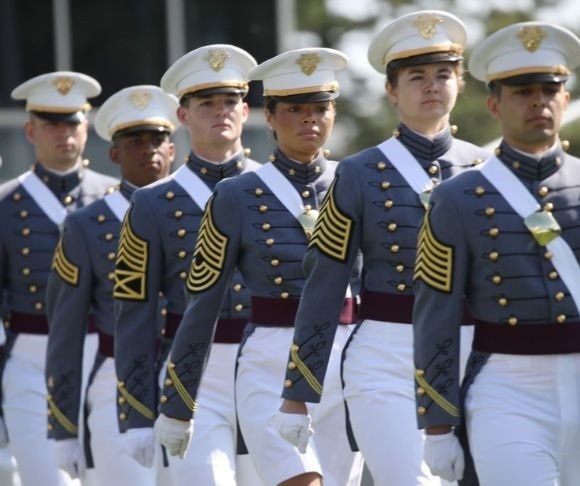The klaxon keeps sounding the alarm — but no one seems to notice. A recent Gallup poll revealed the American public has a low confidence level in the military not seen since the Jimmy Carter administration. The findings are consistent with the services’ challenge to find willing recruits and similar surveys looking at confidence in the US Defense Department during the Biden administration. When people lose faith in the institutions designed to keep them safe, they will look for other remedies. That is not a good option.
On July 31, a Gallup poll showed low confidence in the military reminiscent of numbers seen in 1979, when Iran held 52 American diplomats hostage for 444 days in the US embassy in Tehran. Worse, President Carter ordered a rescue attempt, Operation Eagle Claw, that was bungled, resulting in the death of eight American servicemen and no hostages set free. At that time, Americans’ confidence in the military hit a nadir of 50%, the lowest level in half a century.
Lowest Confidence in Military in 25 Years
The recent Gallup poll showed only 60% of Americans have confidence in Biden’s military. Not since the Clinton administration in 1997 has the percentage been at 60% — but it is today. Americans’ confidence in the military rose to 85% after the Islamic jihadist terrorist attack on 9/11. It stayed at about 70% “until dipping to 69% in 2021 and declining further since then, following the poorly executed exit from Afghanistan,” Mohamed Younis wrote for Gallup. But the Biden debacle in Afghanistan is only part of the story. Most concerning is that Republicans — who in every geopolitical atmosphere could be depended on to be solidly behind the soldiers, airmen, seamen, Marines, and Guardians — show flagging support. The Gallup analysis explained:
“Throughout nearly all of the past 48 years, Republicans have been the most likely to express confidence in the military, and they remain so today — but the rate has declined by over 20 percentage points in three years, from 91% to 68%. Independents’ confidence has dropped nearly as much — by 13 points, from 68% to 55% — and now independents have less confidence than Democrats do.”
Gallup’s survey is not unique in its analysis and conclusions; it substantiates what has become a trend. A 2022 Pew Research study completed last year showed “[t]he share of Americans who say they have a great deal of confidence in the military to act in the public’s best interests has fallen 14 points, from 39% in November 2020 to 25% in the current survey.”
Nevertheless, the military as an institution thrives, perseveres, and persistently rises to national security challenges because the institution believes — from enlisted soldiers to senior leadership – it has a purpose. And those who fulfill it are revered by the citizenry who believe they will keep them safe. It is the most important mutual support system a country can sustain. Unfortunately, Americans’ confidence is eroding in one side of the mutual support group — the military – based on the behavior at the highest level of leadership. It’s happening. The evidence is there for anyone to see who bothers to look.
Gallup Poll Infers No Confidence, No Military Readiness

(Photo by Spencer Platt/Getty Images)
Worryingly damaging to military readiness is the failure of the US armed forces to meet recruiting needs. When citizens’ confidence in an organization that persistently fails to do what it is depended upon to do, it isn’t easy to persuade young people to join. Recruiting data are the most obvious barometer of the appeal of the military. Attempts by the services to convince the desired age group to sign up have not been stellar. As Liberty Nation reported, “The Army has not faced such recruiting headwinds in the last 30 years. I am unaware of a situation where the Army has cut its end strength in response to a negative recruiting outlook,” retired Army Lt. Gen. Thomas Spoehr of the Heritage Foundation explained.
Taking cues from the title of Simon Sinek’s best-selling book on leadership, Start With Why, is a good place to begin. Why, during the Biden administration, has confidence in the US armed forces plummeted? The answer is Biden’s progressive left thinking believes nonessentials for mission accomplishment will win wars and stop America’s most ardent adversaries. If there is no confidence in military leadership to achieve security for the nation, there’s no confidence in the organization being led. No statement is more indicative of this truth than the nonsense outgoing Under Secretary of Defense for Personnel Readiness, Gilbert Cisneros, pushed. “It is a diverse talent pool that ultimately contributes to our success on the battlefield and beyond … Diversity and inclusion are imperative to recruit and retain the best and brightest talent, we must ensure that we reach out to all communities,” he told a Pentagon audience, as reported by Military Times.
Cisneros’ notion could not be further from the truth. Putting together the most highly skilled, motivated, dedicated, and experienced military focused on mission accomplishment and service to the American people ensures “success on the battlefield and beyond,” nothing else. If the Biden administration wants to build confidence in America’s armed forces, resulting in improved recruiting numbers and mission readiness, get the goals of the military right – mission first. America’s confidence in our military will follow.




